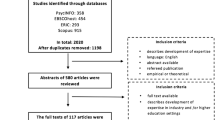Abstract
Teaching expertise in higher education currently receives elevated attention. This attention has also sparked an interest in expertise development, which is the focus of this chapter. The chapter characterises teaching expertise in higher education from a knowledge development perspective, and presents a knowledge development model grounded in the concepts of tacit knowing and self-care. This model provides theoretical sensitivity for an ethnographic case study on knowledge development at the Faculty of Science at University of Copenhagen, where I engaged in fieldwork with an experienced university teacher, and explored the way in which she developed her expertise based on her teaching experience. Analysis of this case highlights that this teacher was involved in an expertise development process that focused on maintaining constructive alignment for students throughout her course.
Access this chapter
Tax calculation will be finalised at checkout
Purchases are for personal use only
Similar content being viewed by others
References
Biggs, J. (2012). What the student does: Teaching for enhanced learning. Higher Education Research & Development, 31(1), 39–55.
Brousseau, G. (2002). Theory of didactical situations in mathematics. New York: Kluwer.
Brousseau, G., & Warfield, V. (2015). Didactical contract and the teaching and learning of science. In R. Gunstone (Ed.), Encyclopedia of science education (pp. 316–321). New York: Springer.
Dreyfus, H. (2007). Detachment, involvement, and rationality: Are we essentially rational animals? Human Affairs, 17(2), 101–109.
Foucault, M. (2005). The hermeneutics of the subject. London: Palgrave Macmillan.
Foucault, M., & Rabinow, P. (1984). The Foucault reader. New York: Pantheon.
Garfinkel, H. (1967). Studies in ethnomethodology. Englewood Cliffs: Prentice-Hall.
Hammersley, M. (2018). What is ethnography? Can it survive? Should it? Ethnography and Education, 13(1), 1–17.
Hammersley, M., & Atkinson, P. (2007). Ethnography: Principles in practice. London: Routledge.
Hattie, J. (2015). The applicability of visible learning to higher education. Scholarship of Teaching and Learning in Psychology, 1(1), 79–91.
Hirschauer, S., & Breidenstein, G. (2002). Endlich fokussiert? Weder ,Ethno‘ noch ,Graphie‘. Anmerkungen zu Hubert Knoblauchs Beitrag „Fokussierte Ethnographie“. Sozialer Sinn, 2(1), 125–128.
Jeffrey, B., & Russell, L. (2018). Ethnographic writing. London: Tufnell.
Knoblauch, H., Soeffner, H.-G., Raab, J., & Schnettler, B. (2012). Video analysis: Methodology and methods. Qualitative audiovisual data analysis in sociology. Bern: Lang.
Krejsler, J. B. (2017). Capturing the ‘Evidence’ and ‘What Works’ agenda in education: A truth regime and the art of manoeuvring floating signifiers. In M. Y. Eryaman & B. Schneider (Eds.), Evidence and public good in educational policy, research and practice (pp. 21–41). New York: Springer.
Littlejohn, A., Jaldemark, J., Vrieling-Teunter, E., & Nijland, F. (2019). Networked professional learning: Emerging and equitable discourses for professional development. New York: Springer.
Mann, C. (2001). After the reform: Reflecting on effective teaching in higher education. British Educational Research Journal, 27(5), 653–657.
McDonald, S. (2005). Studying actions in context: A qualitative shadowing method for organizational research. Qualitative Research, 5(4), 455–473.
Polanyi, M. (1962). Personal knowledge towards a post-critical philosophy. London: Routledge.
Polanyi, M., & Prosch, H. (1975). Meaning. Chicago: Chicago University Press.
Schütze, F. (1983). Biographieforschung und narratives Interview. Neue Praxis, 13(3), 283–293.
Wieser, C. (2015). Technology and ethnography—Will it blend? Technological possibilities for fieldwork on transformations of teacher knowledge with videography and video diaries. Seminar.Net – International Journal of Media, Technology and Lifelong Learning, 11(3), 223–234.
Wieser, C. (2016a). Continuing innovation and development of teacher expertise—The continual transformation of personal knowledge for teaching. Tidsskrift for Professionsstudier, 23, 54–61.
Wieser, C. (2016b). Teaching and personal educational knowledge—Conceptual considerations for research on knowledge transformation. European Journal of Teacher Education, 39(5), 588–601.
Wieser, C. (2018). Evidence and its integration into teacher knowledge: Foucaultian perspectives to link research knowledge and teaching. Journal of Education for Teaching, 44(5), 637–650.
Author information
Authors and Affiliations
Corresponding author
Editor information
Editors and Affiliations
Rights and permissions
Copyright information
© 2020 Springer Fachmedien Wiesbaden GmbH, part of Springer Nature
About this chapter
Cite this chapter
Wieser, C. (2020). Teaching Expertise in Higher Education: Constructive Alignment and How an Experienced University Teacher Maintained Constructive Alignment in Practice. In: Wieser, C., Pilch Ortega, A. (eds) Ethnography in Higher Education. Doing Higher Education. Springer VS, Wiesbaden. https://doi.org/10.1007/978-3-658-30381-5_3
Download citation
DOI: https://doi.org/10.1007/978-3-658-30381-5_3
Published:
Publisher Name: Springer VS, Wiesbaden
Print ISBN: 978-3-658-30380-8
Online ISBN: 978-3-658-30381-5
eBook Packages: EducationEducation (R0)




